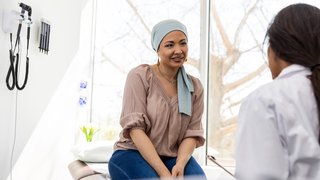
A cancer diagnosis can be devastating – and not just for the patient. As a caregiver, you will experience many changes and your life will often feel turned upside down.
Depending on your circumstances, you may have to take on more responsibility for child care, meal preparation, school events, and household chores, all while providing emotional support to your loved one and other family members throughout the entire cancer journey.
For most people, it can become overwhelming, and the added pressure can lead to caregiver stress.
What are the signs of caregiver stress?
Caregiver stress is caused by added pressure and responsibility during a time when the help and support you have always counted on goes down or away. It can manifest in different ways:
- Physically: Fatigue is one of the biggest signs of caregiver stress. Other signs include loss of interest in activities such as exercise, changes in your personal appearance, and trouble maintaining proper eating habits. Body language, including clenched teeth and muscle tension, can also indicate caregiver stress.
- Emotionally: Depression, irritability, anxiety, and social isolation can be additional signs of caregiver stress.
As a caregiver, it’s easy to put your own needs aside, and it is often expected by others that you do. You feel obligated to maintain a positive attitude. You don’t want your loved one to feel like a burden. Both of you may be missing work – and potentially falling behind on bills.
At Simmons Cancer Center, our multidisciplinary team treats the emotional issues related to cancer diagnosis and treatment, both for patients and caregivers. Sometimes, caregivers come to us directly and ask for help. Often, our team approaches caregivers first.
Ways to relieve caregiver stress
Dealing with caregiver stress is a multistep process. First, you have to acknowledge that you are overwhelmed. It can be hard to admit that you need help, but it’s OK, and it’s completely normal to feel that way.
The next step is to sort out what you can and cannot control. For example, you cannot control that your loved one is sick and needs care, but you can control how you deal with your worry, how you provide that care, and how you use your social network to help you. Our team can help you uncover personal or social areas of support that you might not be thinking of due to the overwhelming amount of stress.
Third, allow yourself some “me” time. You don’t have to feel guilty for participating in activities that make you happy. Go for a walk or run. Take an evening to meet friends for dinner. If you can’t leave the house, watch a movie you haven’t seen or read a few chapters from a new book. A little escape from your daily responsibilities is good for you – and your loved one – because it allows you to recharge, refresh, and refocus.
Benefits of caregiver counseling
The fear of your loved one dying – or of cancer coming back once it’s gone – will always be there. It’s important to talk about your fear, but not all the time.
Our team counsels patients and caregivers to think of their lives as a pie chart. Slices are dedicated to work, play, sleep, and caregiving. When you or a loved one receives a cancer diagnosis, your fear can easily become the whole pie. As a caregiver, you should allow cancer to take up a small piece of the pie – not the entire thing.
Counseling can really benefit you as you try to find that balance. Our team offers one-on-one counseling to help you prioritize so your additional duties are not so daunting. Caregiver support groups can help break the monotony of your routine and help you see that other people have gone through – or are currently going through – the same experience you are.
Keep in mind that you can also speak directly with your loved one’s physician. Oncologists care about the whole health of the patient, and as a caregiver, you are a very important part of your loved one’s well-being. The physician is a wealth of resources for caregiver support and coping methods to help you on your journey.
EMBRACE Survivorship
Cancer survival starts at the moment of diagnosis. Our new support program is designed to help you and your loved one all the way through the cancer journey. EMBRACE Survivorship consists of 9 seminars on topics such as caregiver stress, nutrition during treatment, meditation, and more. The program can help you and your loved one with cancer manage the stress that comes along with a cancer diagnosis.
Facing a loved one’s cancer diagnosis is scary; managing life as a caregiver doesn’t have to be. Seek support if you feel overwhelmed or just need someone to talk to. You and your loved one will both be glad you did.










